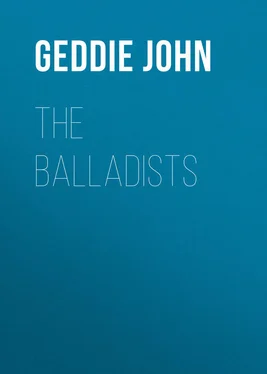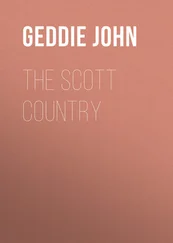John Geddie - The Balladists
Здесь есть возможность читать онлайн «John Geddie - The Balladists» — ознакомительный отрывок электронной книги совершенно бесплатно, а после прочтения отрывка купить полную версию. В некоторых случаях можно слушать аудио, скачать через торрент в формате fb2 и присутствует краткое содержание. Жанр: Критика, foreign_antique, foreign_prose, foreign_poetry, на английском языке. Описание произведения, (предисловие) а так же отзывы посетителей доступны на портале библиотеки ЛибКат.
- Название:The Balladists
- Автор:
- Жанр:
- Год:неизвестен
- ISBN:нет данных
- Рейтинг книги:3 / 5. Голосов: 1
-
Избранное:Добавить в избранное
- Отзывы:
-
Ваша оценка:
- 60
- 1
- 2
- 3
- 4
- 5
The Balladists: краткое содержание, описание и аннотация
Предлагаем к чтению аннотацию, описание, краткое содержание или предисловие (зависит от того, что написал сам автор книги «The Balladists»). Если вы не нашли необходимую информацию о книге — напишите в комментариях, мы постараемся отыскать её.
The Balladists — читать онлайн ознакомительный отрывок
Ниже представлен текст книги, разбитый по страницам. Система сохранения места последней прочитанной страницы, позволяет с удобством читать онлайн бесплатно книгу «The Balladists», без необходимости каждый раз заново искать на чём Вы остановились. Поставьте закладку, и сможете в любой момент перейти на страницу, на которой закончили чтение.
Интервал:
Закладка:
The great religious and social upheaval that had already changed the face of England reached Scotland in a severer form. There was an escape of the odium theologicum which always and everywhere is fatal to the tenderer flowers of poetry and romance. Men's minds were too deeply moved, and their hands too full to look upon ballads otherwise than askance and with disfavour. The Wedderburns and other zealous reformers set themselves to match the traditional and popular airs to 'Gude and Godlie Ballates' of their own invention. The wandering ballad-singer could no longer count on a welcome, either in the castles of the nobles or with the shepherds of the hills. Instead of getting, like Henry the Minstrel, his deserts in 'food and clothing,' these were apt to come to him in the shape of the stocks or the repentance-stool. He had lost caste and character, from causes for which he was not altogether responsible. An ill name had been given to him; and doubtless he often managed to merit it. His type, as it was found on both sides of the Border, is Autolycus, whom Shakespeare must often have met in the flesh about the 'footpath ways,' and at the rustic merrymakings of Warwickshire. Autolycus, too, has known the court, and has found his wares go out of fashion and favour with the great, and has to be content with cozening the ears and pockets of simple country folk. One cannot help liking the rogue, although he is as nimble with his fingers as with his tongue. He has the true balladist's love for freedom and sunshine and the open country. He will not be tied by rule; according to his moral law,
'When we wander here and there
We then do go most right.'
His memory and his mouth, like his wallet, are full of snatches of ballads; and they cover a multitude of sins.
Though no undoubted Scottish specimen was drawn from this pedlar's pack, we know, from the plays of the Elizabethan dramatists and other evidence, that Border minstrelsy had already raised echoes in London town, before King Jamie went thither with Scotland streaming in his train. During the last troublous half century of Scotland's history as an independent kingdom, the raw material of ballads was being manufactured as actively as at any period of her history, especially on the Borders and in the North. It may be called, indeed, the Moss-trooping Age, and the chief members of the Moss-trooping Cycle date from the latter years of the sixteenth century. The Raid of the Reidswire happed in 1575; the expedition of Jamie Telfer of the Fair Dodhead is conjecturally set down for 1582; The Lads of Wamphray commemorates a Dumfriesshire feud of the year 1593; while the more famous incident sung with immortal fire and vigour in Kinmont Willie took place in 1596. To the same period belong the exploits of Dick of the Cow (who had made a name for himself in London while Elizabeth was on the throne), Archie of Ca'field, Hobbie Noble, Dickie of Dryhope, the Laird's Jock, John o' the Side, and other 'rank reivers,' whose title to the gallows is summed up in Sir Richard Maitland of Lethington's terse verse on the Liddesdale thieves; and their match in spulzying and fighting was to be found on the other side of the Esk and the Cheviot.
With the Union of the Crowns, Sir Walter Scott half sadly reminds us in Nigel , one stream of Scottish romance and song ran dry; the end of the Kingdom became the middle of it; and as his namesake, Scott of Satchells puts it, the noble freebooter was degraded to be a common thief. But even the Reformation and the Union did not wipe out original sin or alter human nature. The kingdoms might have outwardly composed their quarrels; but private feuds remained, and even the Martyrs and the Covenanters had their relapses, and loved and sang and slew under the impulse of earthly passion. The Dowie Dens o' Yarrow – perhaps the most moving and most famous of the Scottish ballads – is supposed to have sprung, in its present shape at least, out of a tragic passage that occurred by that stream of sorrow so late as 1616.
Away in the North, what we may call the ballad-yielding age, if it came later and had a less brilliant flowering time, endured longer. They had a fighting 'Border' there that lasted until the '45. The Gordons, of their own hand, have furnished a ballad literature as rich, if not quite so choice, as that of the Douglases themselves. Glenlogie and Geordie were of the 'gay Gordons,' and had the 'sprightly turn' that is held to be an inheritance of the race. Edom o' Gordon – Adam of Auchindoun – did his ruthless work in 1571. It was in one of their interminable quarrels, begun on the farther side of Spey, that, in the year 1592, the Bonnie Earl o' Moray fell so far away as Donibristle, in Fife. The mystery of the Burning of Frendraught took place in 1630; the tragedy of Mill o' Tiftie's Annie – one of the few dramas in which the balladist is content to take his characters from humble life – is dated, from the tombstone in Fyvie churchyard, in the year following, and is placed in Gordon country, and under the shadow of the Setons that became Gordons. The Bonnie House o' Airlie treats of one of the incidents of the Civil War, and, for a wonder, in the true ballad fashion; and it turns, as the balladists are apt to do, a crooked and misliking look on the 'gleyed Argyll'; while that fine Deeside ballad, The Baron o' Bracklay , deals with an encounter between Farquharsons and Gordons in the period of the Restoration.
After this, however, we hardly meet with a ballad having the antique ring about it, even on the Highland Line. The fine gold had become dim, or mixed with later clay. The mood and condition of the nation had changed. The 'end of the auld sang' of the Scottish Parliament was the end also of the ballad. There was an outburst of national feeling, expressed in song and music, over the Jacobite risings of last century; Allan Ramsay rose like a star at its beginning, and Burns shone out gloriously towards its close. But the expression was lyrical, and not narrative. The ballad of the old type no longer grew naturally and freshly by edge of copse and shaw. The collector had his eye upon it, and was already collecting, comparing, and classifying – and, what was worse, correcting, restoring, and improving.
CHAPTER III
BALLAD STRUCTURE AND BALLAD STYLE
'Strike on, strike on, Glenkindie,
O' thy harping do not blinne,
For every stroke goes o'er thy harp,
It stounds my heart within.'
The old ballads were made to be sung; or, at least, to be chanted. An inquiry whether the traditional ballad airs preceded the words, or vice versâ , would probably lead us to no more certain conclusions than that of whether the egg came before the fowl or the fowl before the egg. Both ballads and ballad airs have come down to us greatly changed and corrupted; and probably it is the airs that have suffered most from neglect and from alteration. Notation of the simple and plaintive and sweet old melodies appropriated in the ears and lips of the people to the words of particular ballads came long after the transcribing of the words themselves. There are other elements of perplexity and difficulty in ballad music which require an expert to unravel and explain, and which cannot be entered into here. The subject is referred to only because, in the eyes of the original composers and singers at least, to dissever the words from the tune would have seemed like parting soul from body; and because no right notion can be gathered of the Scottish ballads without bearing in mind the part which the ancient airs have taken in framing their structure and in moulding their style.
Like the ballads themselves, the 'sets' of ballad airs vary with the localities; and even in the same district different airs will be found sung to the same words and different words to the same air. But of many of the older ballads, at least, it may be affirmed that, from time immemorial, they have been preserved in a certain musical setting which has not altered more in transmission from place to place and from generation to generation than have the ballads themselves, and which has so wrought itself into the texture and essence of the tale that it is impossible to think of them apart. The analogy of the Scottish psalmody may, perhaps, be used in illustration. In it, also, there is a 'common measure' that can be fitted at will to the common metre – in the psalms, as in the ballads, the alternation of lines of four and three accented syllables. In the one case, as in the other, there is a certain family resemblance, in the melody as in the theme, that to the untrained and unaccustomed ear may convey an impression of monotony. But to each ballad, as to each psalm, there belongs a peculiar strain or lilt, touched, as a rule, with a solemn or piercing pathos, often cast in the plaintive minor mode, that alone can bring out the full inner meaning of the words, and that is endeared and hallowed by centuries of association. As easily might we explain why the words and air of the 'Old Hundredth' or the 'Old 124th' belong to each other, as analyse the wedded harmony of the verse and music in The Broom o' the Cowdenknowes
Читать дальшеИнтервал:
Закладка:
Похожие книги на «The Balladists»
Представляем Вашему вниманию похожие книги на «The Balladists» списком для выбора. Мы отобрали схожую по названию и смыслу литературу в надежде предоставить читателям больше вариантов отыскать новые, интересные, ещё непрочитанные произведения.
Обсуждение, отзывы о книге «The Balladists» и просто собственные мнения читателей. Оставьте ваши комментарии, напишите, что Вы думаете о произведении, его смысле или главных героях. Укажите что конкретно понравилось, а что нет, и почему Вы так считаете.












